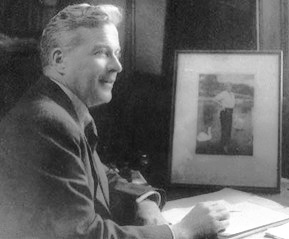 |
| Lionel's classroom in the movie. |
I've heard about schools where the teachers move instead of the students. I've learned about democratic classroom ideas where students write their own rules. While I do believe that students must take charge of their own education, it's still the teacher's class. The teacher is (or should be) the expert on how students learn a particular subject, and should make sure it happens on his terms. (I take the liberty of referring to teachers as males because I'm a male. I'm not offended by female teachers who automatically refer to all teachers as 'her.')
This is what Lionel does. The King must come to Lionel's humble house to receive his lessons. Lionel is the authority, he is the expert, so to be in his own house with his equipment and his rules is paramount.
 |
| The real Lionel. |
Toward the end of the movie (spoiler alert), the King finds out that Lionel has not been trained to be a speech therapist and briefly fires him. Lionel admits to it, but then explains that he helped so many people in the army with it that he decided to make a profession out of it. He may not know the research behind the methods he uses, only that the methods work.
I'm not saying that teachers don't need credentials, but that teachers don't need to adhere to educational philosophies just because professors like them. I think teachers get into the profession because at some point in their life, they taught something to someone and found both a joy and a talent in it. They should stick with what works for them. In school they will probably find educational theories that ring true, and they should try them, but not do everything and anything that some theorist or some speck of research says works.
 |
| Lionel records the King on the first day. The playback proved success. |
Lionel promises the King that before he leaves on the very first day, he will successfully read without stammering. Long story short, he is successful, although the trick he uses isn't practical for regular use. Nevertheless, it accomplishes two things: (1) Lionel proves to some degree that he knows what he's doing, and therefore earns a great deal of trust from his student, and (2) that immediate taste of success, I think, leaves the King thirsting for more.
It may not work 100% of the time for any subject, but it's worth exploring. In my graphic design and multimedia classes, I think it would have something to do with picking one fun, easy (and therefore probably shallow) trick to do something they've never been able to do before. For example, there's a tool in Photoshop called Liquify, with which, among other things, you can create digital caricatures of people's faces. I've noticed that kids find the tool wildly fun and easy to use. I'll come up with other ideas later and maybe share them.

No comments:
Post a Comment